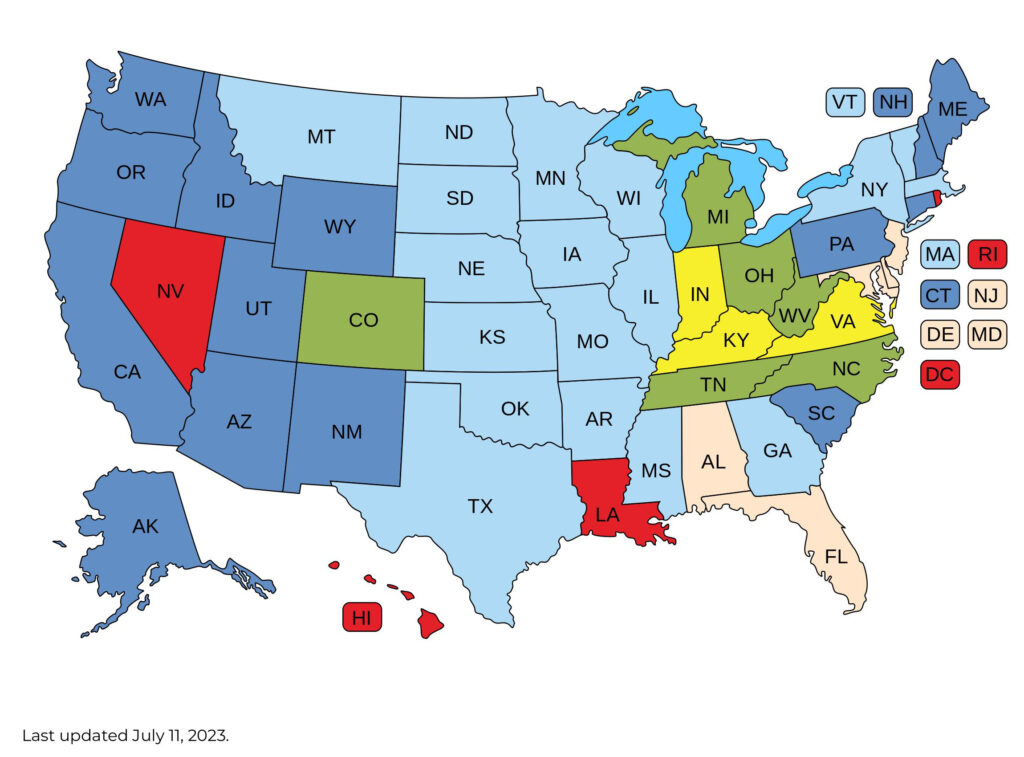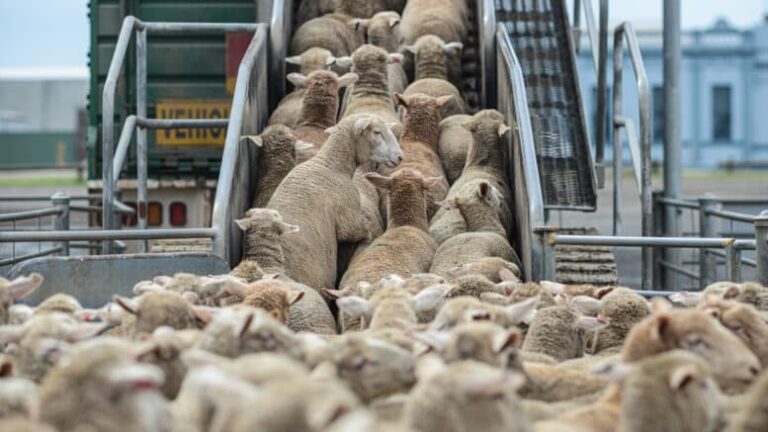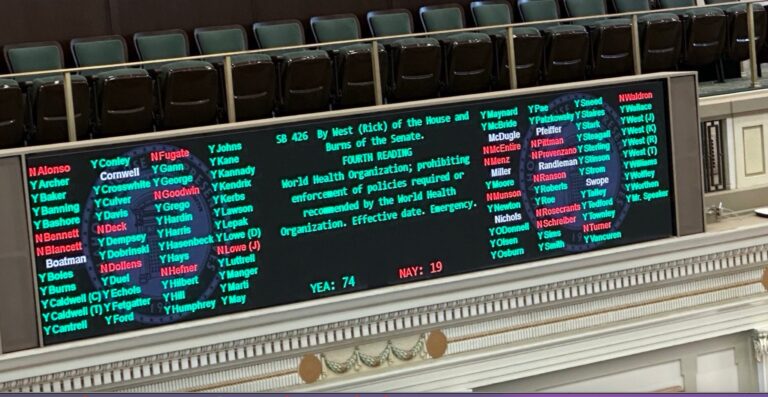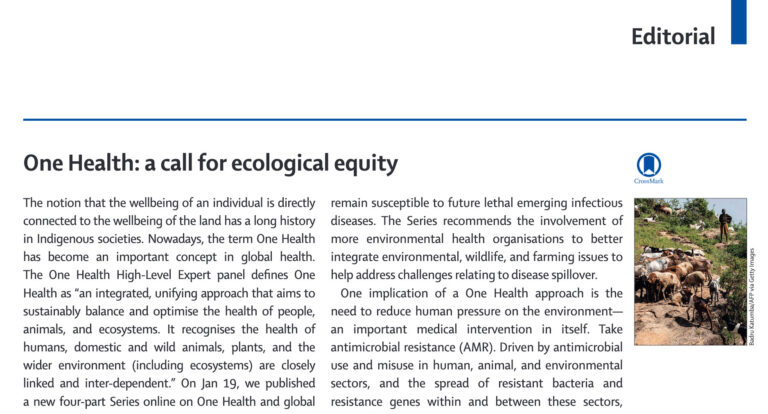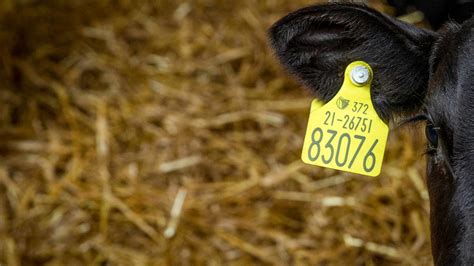This article is a repost taken from the Solari Report and originally published by Real Milk
Blog post first published July 19, 2023. Updated for journal publication and republished September 30, 2023.
View the updated Raw Milk Legal Map, color index, and state-by-state status
Over the past decade or so, a growing number of states have passed laws to either legalize the sale of raw milk and raw milk products or increase access to raw dairy; no year has been as productive as 2023. Resistance from the dairy industry and public health agencies is not as great as it once was, and demand for raw dairy products is increasing rapidly. Through either statute, regulation or policy, 46 states now allow the sale of raw milk for human consumption, the sale of raw milk for pet consumption, or the distribution of raw milk through herdshare agreements.1 The four outliers prohibiting any sale or distribution of raw milk are Hawaii, Louisiana, Nevada, and Rhode Island.
LEGISLATION
The states passing raw dairy legislation this year include:
- IDAHO – Senate Bill 1036 (SB 1036) removes the limit on dairy animals that herdshare operations can have; under prior law, herds were limited to seven cows, fifteen goats, or fifteen sheep.
- IOWA – Iowa became the 46th state to legalize raw milk sales or distribution when Senate File 315 (SF 315) passed into law. The bill allows the sale from producer direct to consumer on the farm or through delivery of any dairy product. There are testing, labeling and recordkeeping requirements.
- NORTH DAKOTA – House Bill 1515 (HB 1515) legalized the unregulated sale of raw milk and any other raw dairy products from producer direct to consumer. Under prior law only distribution of raw milk and raw milk products through herdshare agreements was legal. HB 1515 originally allowed only Grade A dairies (who produce milk for pasteurization) to sell raw milk to the consumer, but those supporting raw milk sales by all dairies hijacked the bill, turning it into the version that passed. The North Dakota Department of Agriculture (NDDA) has issued a press release2 claiming that sales are limited to raw milk only (and not other raw dairy products) under HB 1515 even though the bill states that farms selling raw milk direct to consumers aren’t subject to any provision of the chapter in the North Dakota statutory code, titled “Dairy Product Regulation.”3
- UTAH – House Bill 320 (HB 320) legalizes retail sales of raw milk and any product produced from raw milk if a licensed producer has a majority ownership in the retail store. Licensees may also sell these products on-farm as well deliver and/or sell via refrigerated mobile unit. Prior law limited the raw dairy products licensees could sell to milk, butter, and cream. sell via refrigerated mobile unit. HB 320 marks the fourth raw milk bill since 2015 that the mother-daughter team of Symbria and Sara Patterson, founders of the nonprofit Red Acre Center, have been responsible for passing.
- WYOMING – Senate Bill 102 (SB 102) allows the sale of any raw dairy products produced by unregulated producers in retail stores. Prior law limited transactions to direct-to-consumer. When it comes to food freedom of choice, Wyoming remains way ahead of the curve; allowing any raw dairy products produced by an unregulated farmer to be sold in a retail store would be unfathomable in any other state. How much raw dairy is sold in Wyoming retail stores will likely be determined by what stores’ requirements for a producer to obtain product liability insurance are; it is difficult enough for regulated raw milk producers to get a product liability policy.
The biggest development in 2023 was in Iowa, a state that had once jailed someone for selling raw milk. Senator Jason Schultz (R) and farmer Tom German had been trying for 17 years to legalize raw milk sales in the state. A difference maker this time around was dairy farmer Esther Arkfeld, a mother with young children, who was the face of the effort to legalize raw milk sales in Iowa. Lobbyist Tyler Raygor of Americans for Prosperity (AFP) also helped; Raygor and another member of AFP were the only ones who registered with the state to lobby for the bill; 24 people—representing government agencies, the dairy industry, and Farm Bureau among other organizations—registered to lobby against SF 315.
The national opposition to further legalization of raw milk sales in any state made Iowa a litmus test. Mary McGonigle-Martin, a board member of the national food safety group Stop Foodborne Illness said, “Public health has lost the war on raw milk”4. McGonigle-Martin had testified four different times in opposition to Iowa raw milk bills. Passage of SF 315 into law struck a nerve with the mainstream media, which published more stories about raw milk after the Iowa law went into effect than it had in years. USA Today, the New York Times and Forbes, among other major media, ran stories warning about the “health risks” of drinking raw milk in an attempt to dissuade their readers from joining the millions of people who are already consuming the product.
A trend in recent years that accelerated in 2023 was the legalization of the sale of raw dairy products other than milk. In addition to Iowa, North Dakota, Utah, and Wyoming, laws have also gone into effect since 2021 in Alaska, Montana, New Hampshire, and Texas, allowing the sale of numerous products made from raw milk. Value-added is where the money is at; the trend bodes well for the ability of small-scale dairy farmers to make a living. It appears that the dairy processing lobby is no longer fighting the legalization of value-added raw dairy sales like they once did.
The food safety argument–the only argument the opposition has staked its stance on–is increasingly in favor of raw milk proponents. The latest foodborne illness outbreak figures from the Centers for Disease Control (CDC) are that in 2020 there were five foodborne illness outbreaks resulting in 28 illnesses that were attributed to raw milk consumption.5 The number of raw milk consumers continues to increase considerably; hundreds of thousands of consumers go to realmilk.com each year for the first time to find a source of raw milk in their state. The number of illnesses attributed to raw milk consumption is significantly less than it was a decade ago.
Increased demand, fewer illnesses, and deteriorating quality in the conventional food supply are a formula for raw milk legalization. The next state to lift the prohibition on any raw milk sales or distribution could be Hawaii. That state has had bills for legalizing raw milk sales by micro dairies passed out of the House the last two years only to die in Senate committee. There is only one dairy producing raw milk for pasteurization in Hawaii. For reasons of food security alone, a raw milk bill there should pass into law.
Whichever of the four remaining states is next to get rid of the ban, the goal of Weston A. Price Foundation President Sally Fallon Morell to have legal raw milk distribution in every state is getting closer to realization.
REGULATION CHANGE
MISSISSIPPI: Until recently, Mississippi allowed the sale of only raw goat milk, and then only if the farm had nine goats or fewer. Thanks to state Agriculture Commissioner Andy Gipson, that has now changed per the policy of the Mississippi Department of Agriculture. Under the policy, distribution of raw milk (including cow’s milk) through herdshare agreements is legal; there has been some pushback from the state department of health, but the policy remains in place. Farm-to-Consumer Legal Defense Fund (FTCLDF) has written herdshare contracts for its Mississippi members. Gipson has been one of the more progressive agriculture commissioners in the country. In 2020 he adopted a policy on distribution of meat from custom slaughtered and processed animals—better enabling small farmers and ranchers to make a living—by removing the limit on the number of owners there could be for a custom animal. Prior to becoming commissioner, Gibson served in the Mississippi legislature where he supported several food freedom bills, including legislation to legalize the sale of raw cow’s milk.
COURT CASE: TEST CASE FOR MAINE FOOD SOVEREIGNTY ACT
An important case from Maine Food Sovereignty Act (FSA) and possibly the state’s Right to Food Constitutional Amendment (RTFA) is ongoing in Kennebec Superior Court. Nathan and Rhiannon Deschaine, owners of Kenduskeag Kitchen, their customer Frank Roma, and the Farm-to-Consumer Legal Defense Fund (FTCLDF) have sued Jeanne Landrew, Commissioner of the state Department of Health and Human Services (DHHS), for violations of the FSA and the RTFA. The Deschaines prepare and sell home-cooked meals in Kenduskeag, a town which per the FSA, has passed an ordinance allowing the unregulated sale of most foods direct from the producer to consumer. The FSA gives towns and cities in Maine, the power to adopt ordinances legalizing unregulated local producer-to-consumer commerce within their boundaries.
DHHS sent an enforcement letter to the Deschaines in October 2022, claiming that the couple needed a license to operate their business because, among other reasons, “Kenduskeag Kitchen does not meet [the] definition of direct producer to consumer transactions because it is preparing and selling meals that contain food products and/or ingredients that are purchased from other sites.” The FSA contains no restriction that producers engaging in unregulated commerce under a town ordinance are limited to preparing food with only ingredients that they grow.
Roma is suing DHHS for a violation of the RTFA, which gives individuals the right “… to consume the food of their own choosing …as long as an individual does not commit trespassing, theft, poaching, or other abuses of private property rights, public lands, or natural resources in the harvesting, production or acquisition of food.” Plaintiffs are seeking to have DHHS enjoined from regulating the operation of Kenduskeag Kitchen and requiring it to be licensed; the department has filed a motion to dismiss the lawsuit. A favorable resolution to the case for
the Deschaines, Roma and FTCLDF should lead to a more expansive interpretation of the FSA and RTFA statewide, improving food security and food quality in Maine.
This article was originally a blog post on realmilk.com, and then updated and published in the Fall 2023 issue of Wise Traditions in Food, Farming, and the Healing Arts, the quarterly journal of the Weston A. Price Foundation.
References
- Centers for Disease Control and Prevention (CDC). Access® database for outbreaks reported from 2005 to 2020 from all transmission sources (food, water, animal contact, environmental, and person-to-person) provided by Hannah Lawinger, CDC NORS Data Request Manager on May 26, 2021.
- WAPF, Raw Milk Legal Map and State-by-State Notes, latest update July 11, 2023. https://www.realmilk.com/realmilk-legal-map/
- NDDA, “Raw milk sales now legal, limited to fluid milk,” [Press release], August 4, 2023. https://www.ndda.nd.gov/news/raw-milk-sales-now-legal-limited-fluid-milk
- North Dakota Century Code, Chapter 4.1-25, “Dairy Product Regulation,” p. 10 (point 3 of clause 4.1-25-40.1). https://ndlegis.gov/cencode/t04-1c25.pdf#nameddest=4p1-25-40p1
- Tony Leys “Public Health Has Lost the War – States legalize raw milk, despite public health warnings,” USA Today, July 3, 2023. https://www.usatoday.com/story/news/nation/2023/07/03/raw-milk-legalized-states-unpasteruizeddisease-risks-public-health/70369454007/

